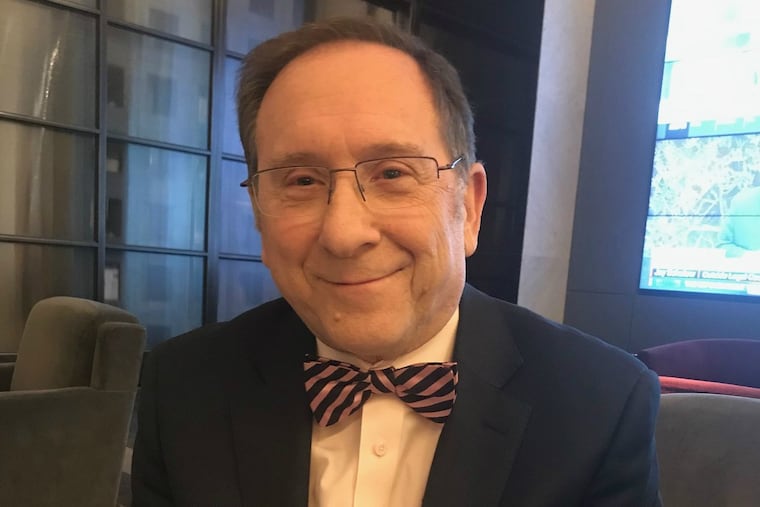Glenn ‘Hurricane’ Schwartz’s climate novel is a mix of crime, sex, science, and a call to action
The meteorologist views his novel as a global-warming call to action and a cautionary tale about drastic weather-modification schemes.

It has dashes of Twilight Zone, crime, theology — and sex that, if not steamy, does generate some heat.
It has generous infusions of science textbook. James Joyce referred to a “barometer” in one of his Dubliners stories, but in The Weathermaker, NBC10 meteorologist Glenn “Hurricane” Schwartz might have written the first novel in history to invoke the term “inter-tropical convergence zone.”
The protagonist is a one-man climate change machine, a TV meteorologist in Baltimore who looks and acts like a Greek god and whose mentor bears more than a resemblance to the more mortal author.
The hero learns that his incredible gift to make it rain isn’t necessarily a gift. Schwartz describes The Weathermaker as a treatise on the collateral consequences of worldwide warming, a call to action, and an allegorical tale about the dangers of renegade weather-modification schemes. Nothing happens in a vacuum in the atmosphere. He is hoping this morphs into a cli-fi trilogy.
Schwartz said his favorite novel is Jurassic Park, by Michael Crichton, who also wrote the controversial State of Fear, a 180-degree different take on global warming. (“I’m no Michael Crichton,” he says.)
» READ MORE: Philly’s average temperatures are rising, along with the overall global trend
Schwartz, a Philly native who attended Central High School, began his career with AccuWeather Inc. in its nascent days, and went on to work for the National Hurricane Center and a New York TV station, where he earned his nickname. For the last 25 years he has been a Philadelphia TV mainstay, serving as the station’s chief meteorologist until 2017, and The Weatherman dishes some inside baseball.
But readers will find nothing on the often colorful (and often off-color) career of former colleague John Bolaris or the salacious scandal involving two on-air anchors some years back.
In an interview this week in Center City, Schwartz said he had been writing and revising The Weathermaker on and off since 2006, a few years after the publication of his nonfiction Philadelphia Area Weather Book, cowritten with former Franklin Institute meteorologist Jon Nese. After multiple tries, he found a publisher for The Weathermaker: Milford House Press, in Mechanicsburg, Pa.
What inspired you to write a novel?
[The Weather Book] had a limited audience, and very limited income. I was talking at lunch with a couple of friends about that frustration. One said, ‘Why not try to write fiction.’ And that night I had the idea for this story. The very next day I started writing.
How would you describe your writing style?
My literary technique is just to write the way I talk.
Your hero gets involved with organized crime, the insurance industry, a rabbi, and … a Hollywood love interest?
If you have a TV weatherman able to make it rain or stop the rain and you become world famous, Hollywood actresses, you know, they want to use it for the drought in Africa. That was a no-brainer to me.
Speaking of Hollywood, I see you made a personal appeal in the foreword.
I always pictured it as a movie. It’s so visual, and there’s so much action.
But that was not your primary motivation?
What I’m trying to do is to get this information out to the big general audiences that wouldn’t necessarily be reading the nonfiction stuff by an actual climate expert. I hope the story is enough to keep people interested.
Was it hard to find a publisher?
I sent it to dozens and dozens of literary agents and publishers and got some kind rejections, and a lot of them didn’t respond at all, but I never got any positive response.
» READ MORE: Here are 10 of the weirdest, most Philly stories of the last decade
So what you made you keep trying?
I guess when the climate-extreme weather connection was starting to be thought of more. When I was rewriting it, every time the language has gotten stronger. Boy, I didn’t go far enough. We have to fix this as soon as possible. I didn’t want to be looked at as extremist, and I didn’t want to be looked upon as being too cautious.
You have racy tales about people in the TV business; are they drawn from personal experience?
A lot of it is related to interviews I did with some of the old-time studio people. TV was so interesting, and there were such characters that were roaming the hallways and so little in the way of rules and discipline. A lot of them are based on reality, but reality decades ago before I got back to Philly.
Our readers might think of your former colleague, John Bolaris, when you describe the handsome hero.
Physically I’m thinking of [former NBC10 meteorologist] Doug Kammerer … tall, handsome … and people just like him … all-American. … John is as tall as I am (not very tall) … And he is not blond and blue-eyed.
How did your wife, Sherry, react to the sex scenes?
She’s OK, as long as I didn’t get too graphic. I have toned it down from the first version.
You stopped doing the 11 p.m. show and being the station’s chief meteorologist in 2017. How is life different?
I’ve been able to put more effort into this [the book] … I get to see my wife in the evening. … I get to ride the train to work. … I have a window for the first time ever.”